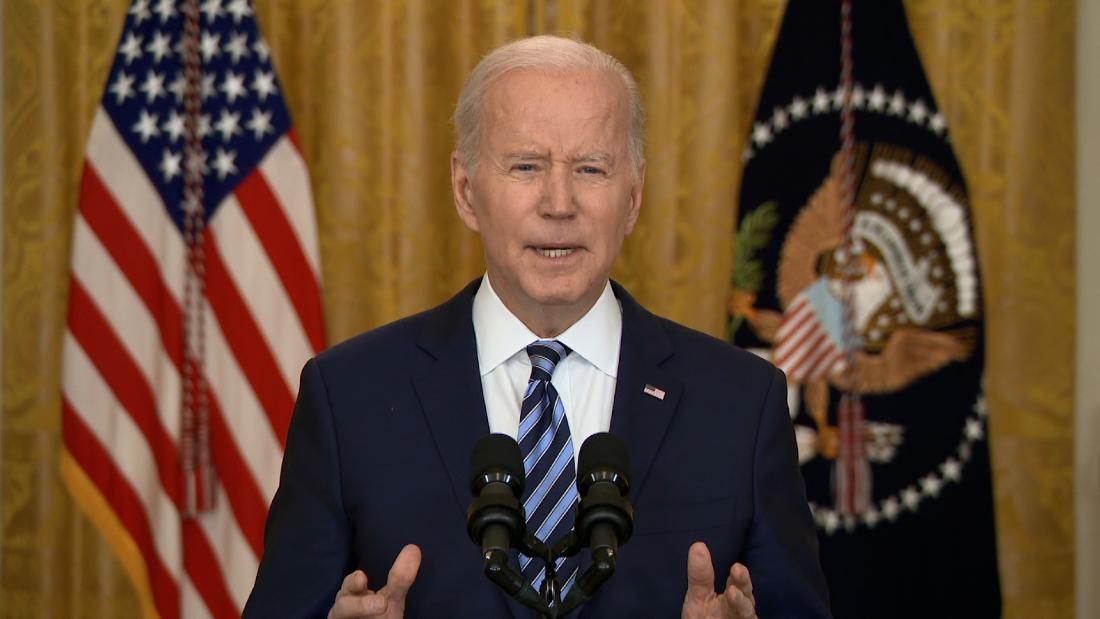Analysis: How Zelensky changed the West’s response to Russia
The Ukrainian President’s heroism has also touched people across the world and set off a torrent of smaller gestures of support. Formula One and European football chiefs have stripped Russia of showpiece events. Russian ballet performances have been canceled in the UK. And some US states are pulling Russian-made vodka off the shelves.
Zelensky’s emotional appeal
The significant stiffening of the global front against Russia over the weekend followed increasingly fervent calls by Zelensky for help. European leaders reported that in a call with them last week, he had said he didn’t know how long he or his country had left.
Few outsiders expected Zelensky, a former comic actor who, to the frustration of US officials, ignored or downplayed US warnings of an imminent invasion for weeks, would morph into a leader to match this moment in his country’s history. His dismissiveness changed a few days before the invasion when he made increasingly heart-rending appeals for help. His earlier reticence may have left many of his countrymen unprepared for the agony that was about to unfold.
Still, under the most extreme circumstances, Zelensky is ironically displaying the very values — including a staunch defense of democracy — that would qualify Ukraine for membership in both the European Union and NATO, a path Putin tried to close off with his invasion.
“They are one of us and we want them in,” European Commission President Ursula von der Leyen said in an interview with Euronews on Sunday, referring to Ukraine.
He has become the rarest of leaders — synonymous with the mood and character of his people at a pivotal moment in history while willing them to ever greater national efforts like British Prime Minister Winston Churchill during World War II or George Washington during and after the American revolution.
In what has already become an iconic comment, Zelensky has rejected American offers of an exit to safety, telling the US, according to his country’s embassy in Britain, “The fight is here. I need ammunition. Not a ride.”
In another poignant message on Sunday, the Ukrainian President warned the rest of the world that although he and his country were in the firing line, he was waging a fight on behalf of worldwide democracy and freedom.
“Ukrainians have manifested the courage to defend their homeland and save Europe and its values from a Russian onslaught,” he said.
“This is not just Russia’s invasion of Ukraine. This is the beginning of a war against Europe, against European structures, against democracy, against basic human rights, against a global order of law, rules and peaceful coexistence.”
An alarming twist in the crisis
Zelensky’s comments came as the Ukraine crisis took an even more alarming turn.
Putin, lashing out at NATO leaders, put Russia’s deterrence forces — including nuclear weapons — on high alert. The move may have been designed to frighten the West, but it also heightened fears of an escalation to truly alarming levels.
Putin’s nuclear rhetoric came as he appeared ever more isolated, with his forces bogged down on the roads to Kyiv and scenes of burned-out convoys hinting at the strength of Ukrainian resistance.
And Monday’s expected crash of the Russian currency, the ruble, on the back of international sanctions could further pile political pressure on Putin and worsen his volatile mood.
A foreboding moment looms
But the question must be asked whether the response is all coming too late for Ukraine.
A three-mile-long Russian column was spotted in satellite imagery on the road to Kyiv on Sunday, fueling dread about a possible assault on the capital that would put civilians in the direct firing line and swell the already high civilian death toll, which local authorities put at 352 on Sunday. Western leaders say that it will take time for sanctions to begin to inflict pain on Putin, the oligarchs who support him and the Russian people. But Ukraine may have days, not weeks, left as an independent nation.
The Ukrainian President’s survival is taking on more importance for the rest of the world too. The tough slog Russian forces have faced underscores the difficulty Russia would have in subjugating a nation the size of France under occupation. A partitioned Ukraine and a full-scale insurgency would be far more effective with Zelensky as a figurehead. His new influence in global capitals and capacity to mobilize political heat on foreign leaders could be invaluable to the Ukrainian cause, which is why an eventual flight from Kyiv might be essential for his country’s hopes of liberation.
But Zelensky and thousands of his fellow Ukrainians know they may be living on borrowed time. Putin appears to be backed into a corner, making it all the more urgent for him to quickly and decisively end the conflict. The Russian leader, who has falsely demeaned Zelensky and his compatriots as Nazis, has a record of scorched-earth responses that pay little heed to civilian losses. Russia’s utter destruction of the Chechen capital, Grozny, in its ruthless effort to crush separatists may hold some foreboding omens for Kyiv in the coming days.
And Zelensky’s extraordinary success so far is only making him a more valuable target for Russia. Moscow may reason that if he is captured or killed, Ukrainian morale and resistance could collapse.
The evidence of the last few days, however, makes that a questionable proposition.
![]()


